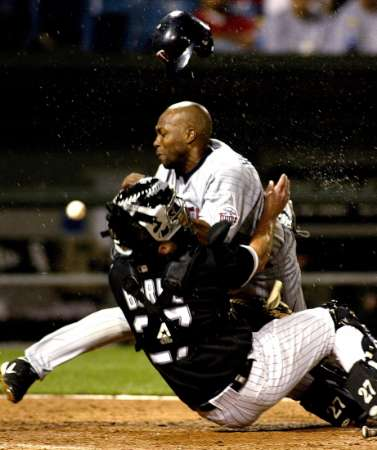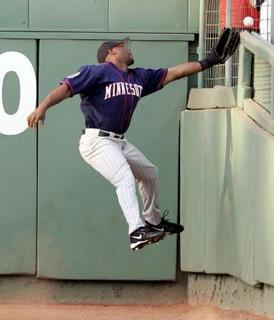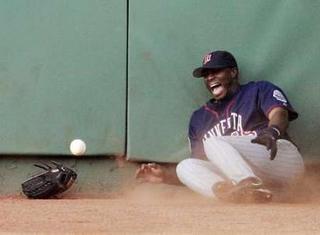September 18, 2005
Trading Torii
The big story locally this weekend was Torii Hunter putting his home in Golden Valley on the market. The local media turned that seemingly innocuous piece of news into rumors of Hunter himself being on the trade market this offseason, and Hunter's comments when asked about the situation reinforced the idea that he could potentially be on the move soon.
Even with Johan Santana emerging as one of the elite pitchers in baseball, Hunter undoubtedly remains the face of the Minnesota Twins. He is a Gold Glove-winning center fielder with power, speed, and an infectious smile, and has been willing to open up to the media both locally and nationally. His emergence as a player coincided perfectly with the team's re-emergence as a contender in 2001.

While extraordinarily popular, Hunter has been criticized quite a bit by Twins fans since signing his four-year, $32-million contract in the winter of 2002. I have been guilty of this in the past as well, often talking about how Hunter's lack of discipline at the plate keeps him from truly becoming a great all-around player.
However, while the general consensus seems to be that the contract was a mistake from the Twins' perspective, I disagree. I liked the deal at the time and continue to believe that Hunter, when healthy, is worth close to what he is being paid. What does that mean, exactly? Well, let's take a look.
YEAR PA VORP
2001 603 26.0
2002 604 50.8
2003 642 19.8
2004 569 31.2
2005 416 23.8
VORP stands for Value Over Replacement Player, and essentially tries to determine how much a hitter is worth over a "replacement-level player" who plays the same position. In other words, Hunter is worth more compared to other center fielders than he would be compared to, say, first basemen. And over the past five seasons he has been worth around 32 runs more than a replacement-level center fielder per 600 plate appearances.
Ah, but what about defense? Unfortunately the problem with trying to get an accurate picture of Hunter's value as a player is that much of his worth is tied into his defense. And while we can all agree that he is a good center fielder, how good is certainly up for debate. Is he the best center fielder in baseball? One of the top three? Top five? Is his defense worth 10 runs per season over the average center fielder? Is it worth 20?
Defensive metrics, while a whole lot better and more reliable than they were several years ago, are still in their infancy compared to the many ways we have to evaluate offense. In looking over the many different defensive numbers for Hunter -- from Win Shares and Ulitmate Zone Rating to Fielding Runs Above Replacement and Diamond-Mind ratings -- I think a fair estimate is that Hunter is worth around 15-20 runs per season over a replacement-level center fielder.
Add that together with his offense and Hunter checks in at around 50 runs above replacement level per season. If you subscribe to the theory that every 10 runs or so above replacement level are worth an extra win for a team, then Hunter is worth somewhere around five wins per season. That leaves the next step as determining how much those five wins are worth to a team, and specifically the Twins.

An entire team of replacement-level players should win around 45 games per season and, assuming they each make close to the minimum salary, cost around $8 million. If you assume that the Twins have a standard goal of winning a total of 90 games per year and their payroll will stay fairly constant at around $60 million, that leaves 45 wins to find and about $52 million to find them.
In other words, to a team like the Twins each win over replacement level is worth around $1.2 million. Multiply that by Hunter's five wins above replacement level and you get $6 million. Toss in a few extra dollars because of what he is likely worth to the team when it comes to marketing, revenue, and exposure and you might get up to $6.5 or even $7 million a year. All of which means he has probably been overpaid by about a million bucks per season, although that number rises now that he is due $10.75 million in 2006 (and the Twins hold a $12 million option for 2007).
If the Twins were forced to pay each player exactly what he is worth, they'd never have enough payroll room to compete with other teams. Instead, they pay small salaries to young players each season, which gives them room to pay a few veterans like Hunter premium salaries. Two of the most important aspects of maintaining a winning team under payroll restraints are always getting younger and always getting cheaper. For a team like the Twins it is almost always worth shedding a large salary if you can also acquire cheap, young players who will be underpaid for several seasons.
Even if you only receive 80% of Hunter's value back in a trade, if that value comes in the form of young, minimum-salaried players you've come out ahead. That's why the Twins are constantly letting veterans leave, via both free agency and trades, and constantly relying on their farm system to restock the team with talent. You simply can't compete with a $55 million payroll when you're handing out long-term contracts at around market value to every veteran on the team.
Even if you only receive 80% of Hunter's value back in a trade, if that value comes in the form of young, minimum-salaried players you've come out ahead. That's why the Twins are constantly letting veterans leave, via both free agency and trades, and constantly relying on their farm system to restock the team with talent. You simply can't compete with a $55 million payroll when you're handing out long-term contracts at around market value to every veteran on the team.
All of which isn't to say a player like Hunter doesn't have plenty of value to the Twins, and especially to other teams. Hell, those five wins above replacement level are worth a ton to the Yankees. If you figure their goal is to win 100 games per season (55 above replacement level) and they have around $200 million to do so, then Hunter is suddenly worth around $18 million per season.
The Twins' decision on whether or not to deal Hunter essentially boils down to which of the following they'd rather have:
In the first scenario the Twins hold on to around 10 wins above replacement level over two seasons while eating up around 19% of the team's payroll. In the second scenario, they've lost about 10 wins over two seasons, but have gained a ton of payroll flexibility and, if general manager Terry Ryan does a good job, a player or two who can step right into the lineup and get back some of the wins that were lost (and potentially provide value past 2007, when Hunter becomes a free agent).
As always, the key to this decision is in the details. Hunter is slightly overpaid on a team with a low payroll, but he does provide good value and plenty of wins, and his impact on the Twins' revenue is likely higher than it would be for other teams. Trading him could also provide good value and plenty of wins, but it all depends on a) which cheap, young players the Twins can get in return, b) what they would do with the money saved, and c) who they have to replace Hunter in center field.
Perhaps the biggest thing in the Twins' favor is that they don't have to rely on a purely hypothetical "replacement-level player" to step in for Hunter. Lew Ford has been doing a solid job playing center field since Hunter went down with his ankle injury in late July, and is hitting .263/.337/.381 on the year. Plus, the Twins drafted a speedy center fielder named Denard Span in the first round back in 2002 and he hit .307/.370/.369 with 23 steals in 117 games between Single-A and Double-A this year.

Replacing Hunter with Ford for an entire season would make the team worse, but the dropoff would be far from catastrophic (Ford has averaged 31 VORP per 600 plate appearances). The real issue is whether or not it's worth downgrading the team in center field in order to pick up a young player or two -- perhaps a second baseman and a corner outfielder, or maybe a third baseman and a designated hitter -- who would provide much-needed depth to a lineup that has been horrendous this season.
In a best-case scenario, the Twins swap Hunter to a big-payroll team like the Yankees, Cubs, Rangers, Red Sox or Orioles for a young infielder and a young corner outfielder, and then spend the significant money saved on another hitter. That would improve three spots in the lineup while making the team younger, and the only dropoff would be from Hunter to Ford in center field. Of course, the tough part is finding a taker for Hunter that not only wants him and his salary, but is willing to part with a young hitter or two to get them.
Today at The Hardball Times:
- A Mini-Dynasty in the Making (by David Gassko)
Today's Picks (105-92, +$1,135):
New Orleans +3.5 (-110) over New York
Tuesday's Picks:
Cleveland (Westbrook) +105 over Chicago (Buehrle)

